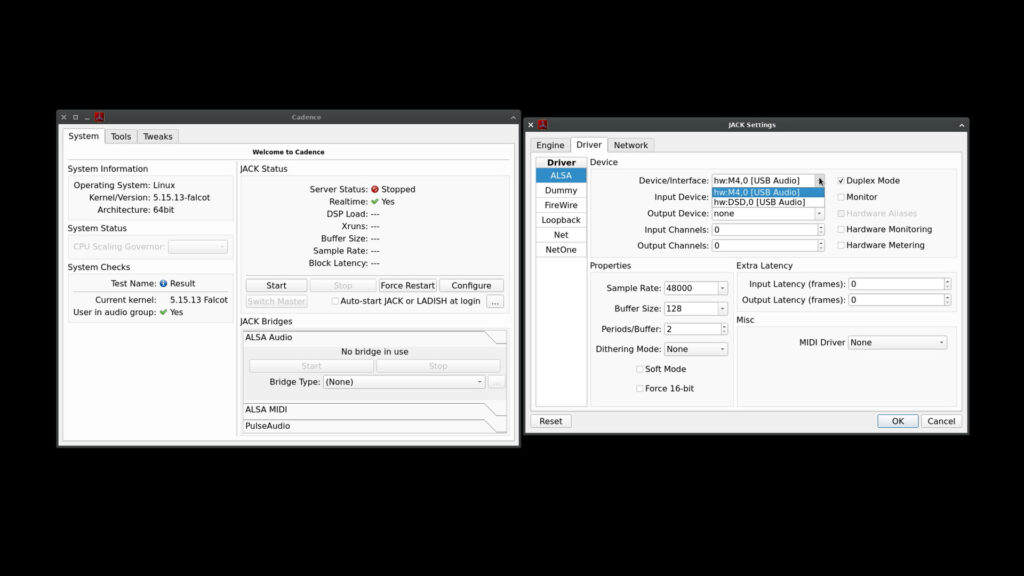MOTU decided to get into the budget market, and I’m really curious to see what they can deliver in the $200 price range. Let’s plug it in and see if it knows how to Linux.
Have questions about your setup? Ask in our forums!
DRIVERS
The MOTU M4 is class compliant, so no additional drivers are needed. You will need kernel 5.14 or later to prevent audio glitches.
PULSEAUDIO
The MOTU M4 will function like any other sound device in pavucontrol.

JACK
Select the ALSA driver to connect your MOTU M4 to the Jack server.

ROUND-TRIP LATENCY
While many kinds of audio latency metrics exist, one useful and well-understood metric is round-trip latency; the time it takes for an audio signal to enter the input of a device, get processed, and exit the output.
Kernel 5.16 brings improvements for low-latency USB audio on Linux and the M4 appears to take advantage of it.
If jack_iodelay is to be believed round-trip latency at 96000Hz/32 went from 3.14ms to 1.74ms. I’m a little suspicious since MOTU reports 2.5ms with the same settings.
Outside of that, the latency measurements line up with what I’ve seen reported by other M4 owners on Windows & MAC.
TESTBENCH
| CPU | AMD Ryzen 5600G |
| RAM | Corsair Vengeance LPX 16GB |
| Motherboard | MSI B550-A PRO |
| GPU | NA |
| SSD | Samsung 840 |
| PSU: | EVGA 600 B1 |
| Firewire: | Syba SY-PEX30016 |
| Network: | Intel i350-T4 |
| OS: | Debian Testing |
| Kernel: | 6.0 RT |
| Desktop: | XFCE 4.16 |
VERDICT
The MOTU M4 aimed for the Focusrite Scarlett 4i4’s throat, and let’s just say they stuck the landing. They even threw in a power switch like a responsible adult, flashy blinky meters for your inner disco DJ, and individual buttons for phantom power and monitoring because, you know, convenience matters.
No software headaches, but you’ll need kernel 5.14+ unless you enjoy your audio sounding like a glitchy chiptune concert.
AD/DA conversion? It’s decent for the price tag. Not going to rewrite the laws of physics, but hey, no complaints.
Meters: Fun to watch, sure. But setting accurate input levels with these? Forget it. They’re always on, like that annoying party guest who just won’t leave.
Rack mounting? MOTU, where’s the love? You do it for your Ultralite buddies, so what gives? Boo indeed!
But wait, there’s more! Overall, the M4’s well-built, sounds good, and packs a punch for its price. It won’t dethrone my 828MK3 (sorry, champ!), but an Ultralite MK5 just might… if I ever manage to find one without selling a kidney.
MOTU M4

MOTU M4 Desktop 4×4 USB Type-C Audio/MIDI Interface.
Pros
Two 60dB preamps.
Two line level inputs.
MIDI
Power switch.
Cons
Unnumbered volume meters.
No option for rack mounting.
Have questions about your setup? Ask in our forums!





Add comment